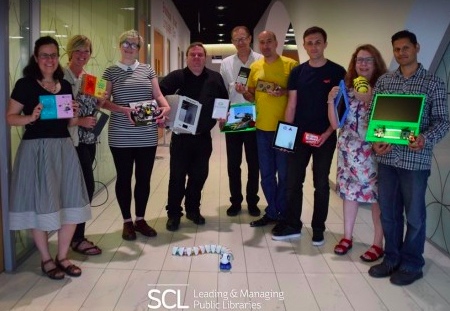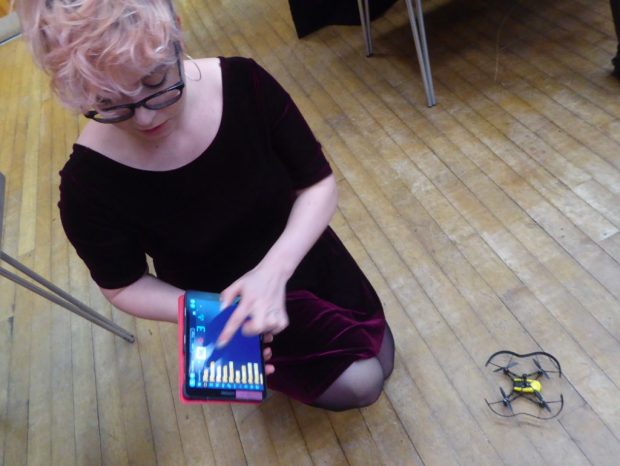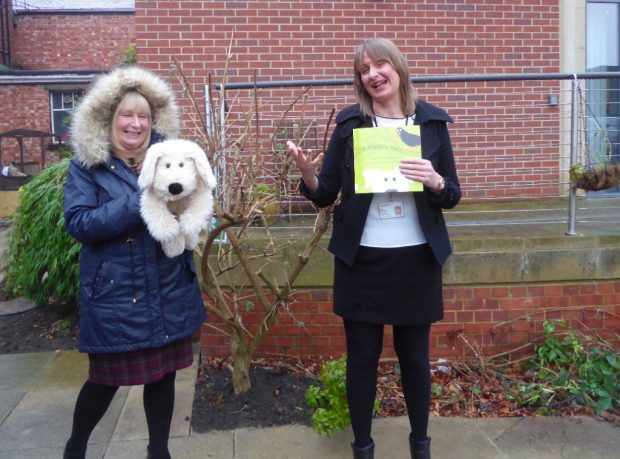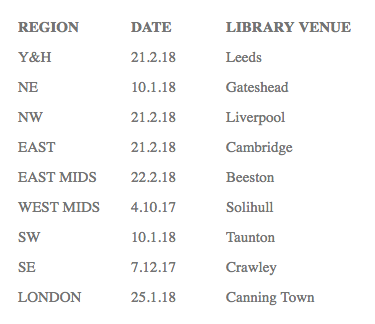
![]() Learning and Digital Universal Offer leads from the Society of Chief Librarians (SCL): Julie Griffiths and Ayub Khan joined forces – and budgets – to plan a national series of SCL Roadshows. There will be 9 in total, and I was able to attend the one held in Gateshead library, on 10 January 2018.
Learning and Digital Universal Offer leads from the Society of Chief Librarians (SCL): Julie Griffiths and Ayub Khan joined forces – and budgets – to plan a national series of SCL Roadshows. There will be 9 in total, and I was able to attend the one held in Gateshead library, on 10 January 2018.
Gateshead library
Before I describe the roadshow experience, a couple of lines on Gateshead library. A Carnegie building which opened in 1926, it has since been extended to include an art gallery, community room and shop. It was refurbished in 2011. There is a library garden leading out from the children’s library, which was very useful for the practical part of the workshop later on! It is a short walk from the town centre, but has free parking and is close to a large park and leisure centre.
The roadshow
Details about the background to the roadshows and a timetable of what’s taking place where and when are on the SCL site. The page includes a video welcome from Ayub and Julie. Northeast is one of the smaller regions, but there were still around 30 people in the community meeting room. Each section of the day worked well as we could share ideas and quiz the presenters easily when we were split into smaller groups of 10.
Workshop 1: digital kit
These sessions were designed with the help of a group of a group of digital enthusiasts from around the country who volunteered.

All roadshow participants were provided with a resource pack which lists a wide range of digital equipment being used in libraries: from bee-bots to vinyl cutters, and a selection was brought to each roadshow. In Gateshead, Amy Hearn (Development Librarian from Kirklees libraries) brought a suitcase full - and showed us a code-a-pillar, bee-bot, drone, sphero, and makey makey kit in action.

The hands on element was also a chance to think about how these resources might be deployed in a library learning situation - from making obstacle courses for code-a-pillars, turning a staircase into a piano, to using drones with children who were learning to code. The latter shows the real impact their string of code had (especially when one tiny parameter was forgotten - such as a safe landing…… or was that just us!). The resource pack also contains links to guidance and notes that the demonstrators put together around their projects - to provide further ideas.
Family learning toolkit
At the start of this part of the roadshow, participants had a quick recap of the learning offer, and the core things that visitors can expect in all libraries: free resources for studying and learning, study space, information about a range of free and low cost learning opportunities (often linked to the adult education offering of the council), opportunities to explore and be creative, and places for communities and individuals to explore and learn together.
The Learning Offer team commissioned Common Vision to look at how libraries could offer more and different family learning opportunities and they produced this report: The Experiential Library: the future of family learning.
One of the first things to think about is “what is family learning?” And there are a range of views - from learning together - as a family group, adults learning from children/children learning from adults. The definition shared was “Activities outside a formal education setting, undertaken by members of two or more generations who have a family, guardianship or caring relationship”.
Alongside the report, Common Vision and the Learning Offer team have created a toolkit to help libraries deliver family learning. It contains information, ideas and inspiration - plus a 7 step plan for activities.
As part of the workshop discussion, we shared what different people were doing at the moment - starting with traditional rhymetimes, code clubs etc, and talked about specific events run on a one off basis. These included:
- Libraries Week
- Fun palaces
- Big Bang science party
- activities around World War One commemorations
- Inter faith week
We also explored the question of why it was important to run events with a focus on families - and ideas discussed included:
- new audiences, brings in the rest of the family (in the cases where one member is the reader)
- library events tend to be free - people are looking for free/low cost activities
- opportunities to raise the profile of what else the library does
- opportunity to get feedback from participants
- maintaining engagement beyond early years
- encouraging an interest in place/local environment
Lots of discussion followed about target audiences, potential partners and better marketing and publicity. All aspects are explored further in the toolkit. To download a copy, fill in the form and a copy will be shared.
Practical session: family storywalks
The last session was to take a practical look at one of the activities explored in the family learning toolkit: storywalks. This concept was reported in the Taskforce blog written by Tiffany Haigh: Family storywalks in Kirklees. It centres on bringing stories to life by walking and talking. The team in Gateshead have plans to do these, so the workshop was a good opportunity to work through ideas.
It definitely illustrates family learning, and is a step beyond traditional storytimes. A chance for children to share what they have discovered with their family, and have new experiences. They learn new things, and new words. And it can be an easier way for parents who have lower literacy to share stories with their children. It also gets people moving - so contributes to the health and wellbeing and anti-obesity agenda.
They are lucky in Gateshead to have several parks near to the library, but a storywalk doesn’t have to be in a green space - it could be a walk to a local school or landmark.
We discussed the wide range of benefits such activities offer, such as improving social skills, vocabulary, confidence, breaking down any sense of isolation, or exclusion, giving people a sense of place and an appreciation of nature, sharing parenting skills and family groups interacting with other family groups. After this, we also talked about planning this activity, covering a wide range of things to be considered, from strategic goals, to risk assessment, and the vital tasks of choosing the story and route.
One interesting discussion was around thinking about where to start. If your aim is to attract new families, and you tell them that it will start at the library, this might be a barrier for those who don’t normally use it - so it might be an idea to consider starting in the park or another local gathering place.
The group then moved to the library garden and heard - or should that be took part in A Puppy’s tale by Alan Windram.

We walked around the garden, and as the story unfolded, we made the appropriate noises, and did the actions. As you can’t necessarily rely on nature to perform, the team had put laminated pictures of birds, squirrels, frogs etc in the right places to illustrate the story. The whole thing was an enjoyable experience - when was the last time you wagged your tail?! Children also love seeing adults joining in.
To complete the activity, it’s helpful to think about what else you might do - perhaps a craft activity, sing a song, or back in the library, look for other story books with animals. The story you choose does shape the walk, but back in the workshop, we chose a selection of picture books at random, and it was fairly easy to think of scenarios and activities where each could work. [For the record, Rosie’s Hat by Julia Donaldson would be perfect if your library is near a beach!]
Final discussions included investigating the idea of a permanent story walk, using boards and trigger questions - so families could do it without a guide. And what about using technology? Perhaps challenge people to take photos as they went along - and story board it - something to take home and look at afterwards. Or maybe back in a code club environment children could make a bee-bot map for the route they had taken for their story? Alternatively you could link to health and well-being by encouraging use of a fitness app to record the route, with questions like guess how many steps so far, and how much energy have you used?
What next?
I think these roadshows provide an excellent opportunity for staff to ask questions and share ideas among their colleagues from around the region - plus visit a library they may not have seen before. The list of workshops is on the SCL site. I’d encourage all library workers in areas which haven’t yet had their workshops yet to find out if there is space, or which of their colleagues might be planning to attend - and for those in regions where the workshops have already happened, why not find your colleagues who went and ask them about it!

I look forward to hearing that a raft of innovative family learning activities have been planned, and teams are making the most of some of the simple items in the digital kit resource pack to bring their learning sessions to life - whether with toddlers or adults! If any are delivered in your library, we’d welcome a guest blog post from you, so do contact us librariestaskforce@culture.gov.uk